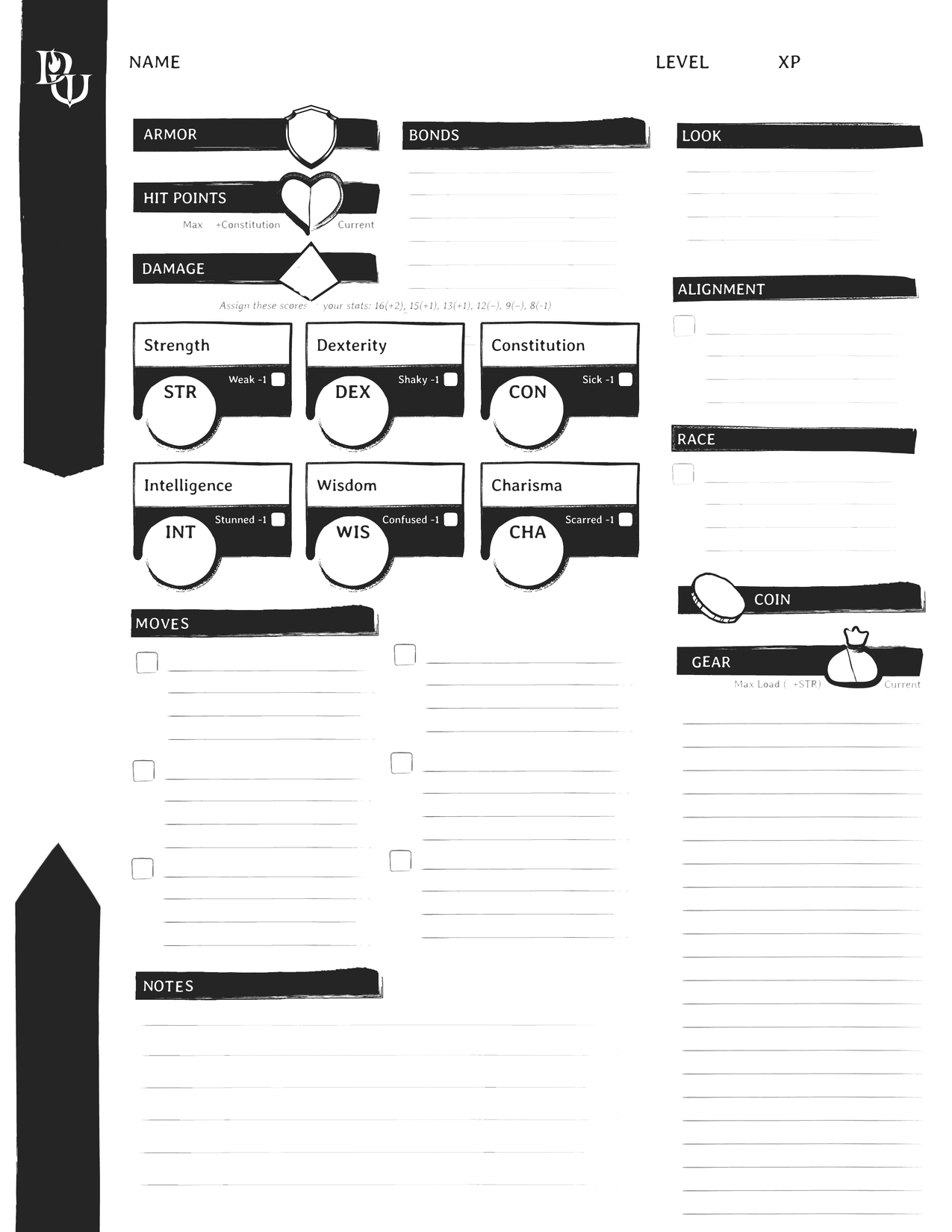
Hey all. Longtime lurker on the community and I love it. My players LOVE all the fiddlybits of Pathfinder and whatnot, and in order to make the game feel less constricted and a little more free-flowing (and still be pretty) I’ve made a generic, one-page character sheet. I’m going to allow the players to be “generic” characters and branch out into whatever it is they want to do. I’m thinking in the style of Skyrim. If they want to get good at magic, well, they can do magic. In any case I spent some time creating this generic sheet from pieces of the playbooks. Any suggestions/ideas on how to run a campaign this way? I was going to let them have a pick of anything in the moves categories. Maybe starting with a max of 3 moves to choose. My thoughts now, in addition to the level restrictions, that the PCs would have to have at least 3 moves from the starting moves of a given class in order to get an advanced move of appropriate level. Any other ideas?
Hope ya’ll like it!

If you’re not using the playbooks, what specifically are you gaining from using DW? It’s probably going to be easier to transport that to Pathfinder than to try to make DW more generic like this.
I’m using everything but the titles of the classes. I like everything about the system, but I want my players to build their characters without a notion of “class,” since, ultimately, those words don’t mean a lot. I’m still going to be using all of the moves and perks. The same racial bonuses. The same moves. The same alignment ideas. The same bonds. I’m just allowing my players to pick and choose. I believe the creators have said, somewhere, that you can play DW classless and it would still work (not sure where I read that).
But I’ll keep that in mind as I move forward! Thanks for the input.
You could take a look at Class Warfare that is a ressource for somewhat more open characters.
Dylan Plung the notion of “class” covers a whole bunch of things at the fiction and mechanics level. First and foremost – a lot of starting moves come as packages. Prepare Spells and Commune are useless without Cast a Spell, for example. And how if you have Prepare Spells and Cast a Spell, you also need Spellbook.
Aaron Griffin
Yes I do agree! The branching “trees” of the move list will keep players grounded in those notions. So yes, you need all the prerequisites a wizard normally needs in order to use spells, etc. But it also frees up players to dabble in whatever they feel like. If a character wants to be a trap-sensing wizard, he/she can manage without any hindrance. That’s what I’m going for. As I said, I was thinking about skyrim’s branching paths.
Class Warfare is totally what you’re looking for.
You might tone down the requirements for entry into each “specialty,” but it’s all about mix-n-match, build your characters.
Jeremy Strandberg awesome! I’ll look into it. Thanks!
Beware, not all moves are created equal, especially starting moves. There are moves, especially starting moves, that add color to a character, but you’d feel cheated if you paid a full “move slot” for it, like “Port in a Storm” or “Flexible Morals”. There are also moves that are far more powerful than other moves, like “Cast a Spell”, “Shapeshifter” and “Ritual”. Those are intended to be partly balanced out by crappy hit points and damage dice. Class Warfare is probably what you want.
Aaron Griffin, I play DW first and foremost for the full/partial success distinction, and the power of the rule that DM gets to make a move on a fail. Having class playbooks is nice, but secondary.
colin roald
I couldn’t agree more! Well put.
colin roald those are simple enough mechanics to port to almost any system. My original point being that if that is all you care about, and the players like Pathfinder, just add partial success / success at a cost into Pathfinder. Player facing dice mechanics are harder to port, but it’s easy enough to use player failures to escalate an encounter or background events in some manner. A lot of GM Moves in PbtA games are things that are considered “good GMing” in other games.
I suppose all my other reasons boil down to “not wanting to have to play Pathfinder”, so sure, if everyone likes Pathfinder, go for it.